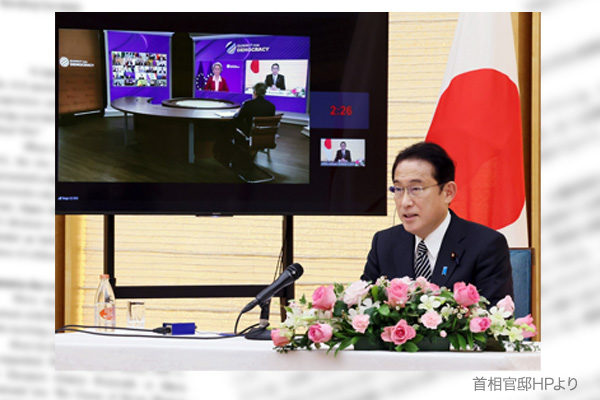Japan’s National Diet has again shelved a resolution condemning the Chinese government for human rights abuse in the Xinjiang Uyghur autonomous region and other areas as Prime Minister Fumio Kishida and Secretary General Toshimitsu Motegi of the ruling Liberal Democratic Party have given consideration to China’s potential reaction and the cautious stance against such resolution within the LDP’s junior coalition partner Komeito. At the U.S.-hosted Summit for Democracy on December 9, Kishida vowed to raise his voice against serious human rights situation with China’s crackdown in his mind. Can he insist on respecting human rights while the anti-China resolution being shelved?
Clear gap between Japanese and U.S. responses
The resolution had been watered down to weaken criticism against China, excluding the word “China” in the first place. During an ordinary Diet session ended in June, opposition parties approved the resolution. But then LDP Secretary General Toshihiro Nikai decided to shelve the resolution in looking at the LDP’s cooperation with Komeito in elections. Nikai known for his pro-China attitude stepped down upon the inauguration of the Kishida administration in October, apparently making it easier for the Diet to adopt the resolution.
During an extraordinary Diet session in December, the resolution was watered down further, excluding words such as “[human rights] abuse” and “condemn.” The promoters of the resolution still accepted the revision, believing that it would be meaningful for the Japanese parliament to adopt the resolution to demonstrate its attitude of respecting human rights to the international community.
But incumbent LDP Secretary General and former Foreign Minister Motegi has turned hesitant to get the resolution adopted before the government decides whether to declare a diplomatic boycott of the Beijing Winter Olympic Games. It is speculated that the prime minister might have delayed the boycott decision in a bid to prevent the China resolution from being adopted.
As LDP Policy Research Council Chairwoman Sanae Takaichi and others called for adopting the resolution, Motegi responded: “What matters is not the content of the draft resolution but the timing. The timing is not right [for adopting the resolution].” I would ask Motegi when the timing will become right. In addition to regretting Motegi’s response, Takaichi should be ready to offer resignation from the current LDP post.
In the United States, the Senate and House of Representatives had just passed bipartisan legislation to essentially ban all imports from Xinjiang for the reason of Uyghur forced labor, symbolizing the difference between the Japanese and U.S. legislatures in dealing with human rights.
Kishida betraying flagship policy
Regarding the Chinese human rights crackdown in Xinjiang, a long time has passed since the presence of concentration camps for more than one million Uyghurs was revealed. Nevertheless, Japan’s legislature has yet to take any action against the crackdown. “This issue is not simply a confrontation between China and ethnic minorities or between Japan and China,” said critic Kotaro Miura involving in serial articles on testimony by Uyghurs in Japan for Monthly Magazine SEIRON. “It is a confrontation between values, between belief and its denial and between liberal democracy and totalitarianism.”
“My cabinet gives importance to protecting human rights and other universal values at any cost,” Prime Minister Kishida said at the plenary session of the House of Representatives on December 9. Nevertheless, Kishida has not only delayed a decision on the diplomatic boycott of the Beijing Olympics but also failed to participate in or support a framework by democracies to monitor the export of advanced technologies that could be exploited by China and other authoritarian countries for cracking down on human rights. And this time, he has shelved the China resolution. It would be better for Kishida to withdraw his flagship policy of respecting human rights.
Takashi Arimoto is a Planning Committee member, Japan Institute for National Fundamentals, and publisher of Monthly Magazine SEIRON at the Sankei Shimbun newspaper.


